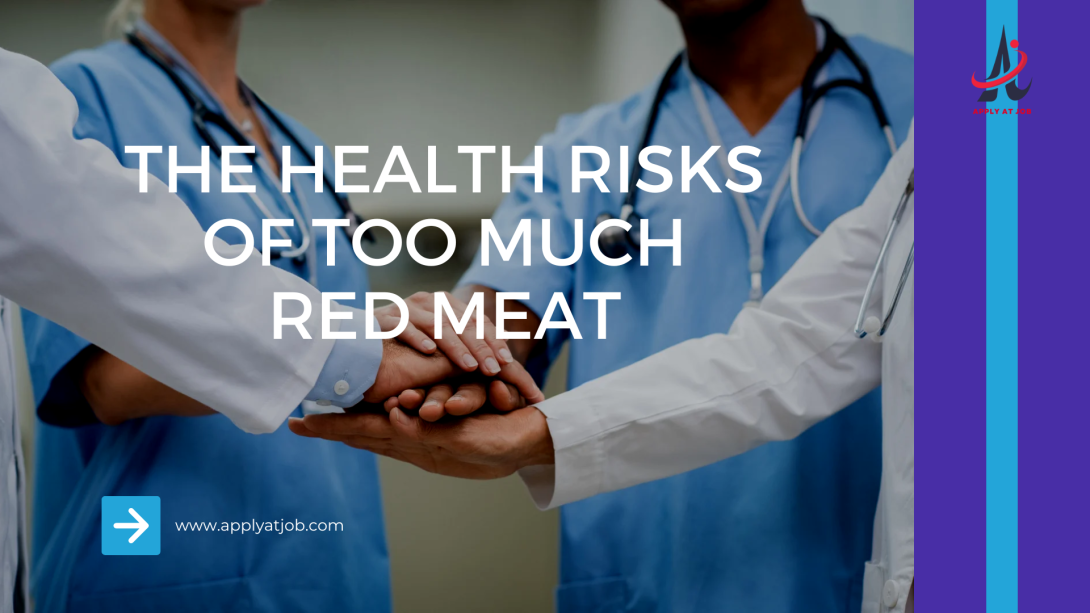
The Dangers of Excess Red Meat on Your Health
For millennia, red meat, which comprises goat, lamb, pig, and cattle, has been a mainstay in many cuisines all across the world. Although red meat is a wonderful source of iron, protein, and other important minerals, eating too much of it can have a number of negative health effects. Many studies conducted over the years have connected heavy red meat intake to a higher chance of developing chronic illnesses including diabetes, cancer, and heart disease. We will discuss the possible health hazards of consuming excessive amounts of red meat in this blog post, along with suggestions for a well-rounded diet.
1. Elevated Heart Disease Risk
The association between excessive red meat consumption and cardiovascular disorders, such as heart attacks and strokes, is among the most worrisome dangers.
. Rich in saturated fat: Saturated fats, which are found in red meat, have the potential to increase LDL (bad) cholesterol levels. The accumulation of fatty deposits in your arteries due to elevated cholesterol might raise your risk of heart disease.
. The worst are processed red meats: Because processed red meats like bacon, sausages, and salami frequently include extra salt and heart-healthy preservatives like nitrates, they put consumers at even greater danger.
. Research confirming the connection: Studies have indicated that those who eat a lot of red meat, especially processed meat, are far more likely to those who consume less.
2. Higher Chance of Cancer
High intake of red meat has also been linked in a number of studies to an increased risk of cancer, especially colon cancer.
. Carcinogenic substances: When red meat is cooked at high temperatures (such as grilling or frying), it releases toxic compounds known as polycyclic aromatic hydrocarbons (PAHs) and heterocyclic amines (HCAs). These substances are known to harm DNA and promote the growth of cancer.
. Meats that have been processed: Red meats that have been processed include preservatives like nitrates and nitrites, which the body can transform into chemicals that cause cancer. Processed meats were categorized by the World Health Organization (WHO) in 2015 as a Group 1 carcinogen, which indicates that there is substantial evidence linking them to cancer.
3. Diabetes Type 2 Risk
Consuming excessive amounts of red meat, especially processed red meats, has been associated with a higher risk of type 2 diabetes.
. Insulin resistance: When the body's cells lose their sensitivity to insulin, it can be caused by consuming large amounts of saturated fat from red meat. One of the main risk factors for type 2 diabetes is insulin resistance.
. Diabetes and processed meats: Research indicates that those who eat a lot of processed meat have a 20–30% higher risk of developing type 2 diabetes compared to those who consume little to no processed meat. These foods' high salt, nitrate, and saturated fat content may be the cause of this elevated risk.
4. Adverse Impact on Digestive Health
Overindulging in red meat can also have a detrimental effect on your digestive system.
. stomach bacterial imbalance: Consuming excessive amounts of red meat might encourage the growth of pathogenic bacteria in the stomach. Digestive problems such as inflammation, bloating, and constipation may result from this imbalance.
. Increased TMAO production: Trimethylamine-N-oxide (TMAO) is a chemical produced during the digestion of red meat. Elevated blood levels of TMAO have been linked to a higher risk of stroke and heart disease.
5. Possibility of Putting on Weight
If consumed in excess, red meat—especially fatty cuts—can cause weight gain.
. Calorie-dense: Red meat, especially when cooked with additional fats like butter or oils, is high in calories. Regularly consuming big amounts of food might result in an excessive caloric intake, which can cause weight gain.
. Relationship to obesity: Several research have indicated a direct association between a high intake of red meat and an increased chance of obesity. Heart disease, diabetes, and several types of cancer are just a few of the chronic illnesses for which obesity itself is a significant risk factor.
6. Diminished Lifespan
Excessive eating of red meat has been linked to shortened lifespans in studies.
. Overall mortality: Studies have shown a correlation between higher overall mortality and higher intake of red and processed meats. This is probably because diabetes, cancer, and heart disease all have compounded risks that can shorten life.
. Plant-based protein substitution: Research has demonstrated that consuming plant-based protein sources including legumes, nuts, and seeds in place of red meat reduces the chance of dying young. Longevity and better health outcomes are linked to plant-based diets.
7. Environmental Impact
Although not directly connected to health, it's important to remember that consuming too much red meat has a big impact on the environment.
. Emissions of greenhouse gases: The production of red meat is a major source of greenhouse gases, including methane, which fuel global warming. Cutting back on red meat consumption can help reduce carbon emissions.
. Water consumption and deforestation: Raising cattle for red meat uses a lot of water and land, which contributes to water shortages and deforestation in many areas. Reduce your consumption of red meat to contribute to the preservation of these vital resources.
Conclusion:
Although eating too much red meat might be beneficial for your health, there are serious concerns associated with overindulging in it, such as a higher chance of heart disease, cancer, diabetes, and weight gain. Limiting your consumption of red meat and placing a high priority on a balanced diet full of plant-based foods, lean proteins, and whole grains will help safeguard your health. You may lower your chance of developing chronic illnesses and improve your general health by making thoughtful food decisions.
You can visit our site: Applyatjob.com
https://applyatjob.com/hiring-employee
https://applyatjob.com/jobs




